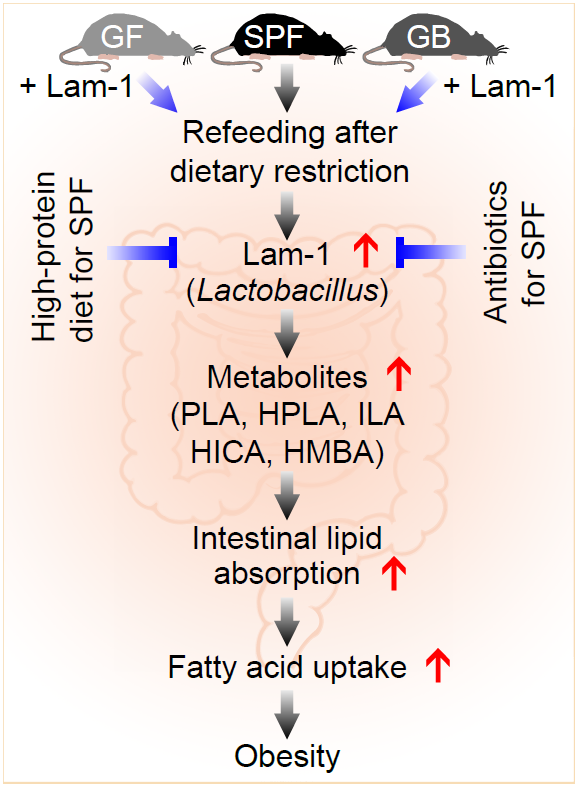Researchers Reveal Mechanism of Post-dieting Fat Mass Increase and Obesity and Strategy of Nutritional Intervention
A recent study led by Prof. ZHAI Qiwei from Shanghai Institute of Nutrition and Health (SINH) of Chinese Academy of Sciences (CAS) revealed that enrichment of Lactobacillus and its metabolites after dieting enhanced intestinal lipid absorption and led to quick fat accumulation and obesity in mice, which can be prevented by a high-protein diet or specific antibiotics through inhibiting the growth of intestinal Lactobacillus. This work entitled “High-protein diet prevents fat mass increase after dieting by counteracting Lactobacillus-enhanced lipid absorption” was published in Nature Metabolism on December 1st, 2022 and high-lighted as “A high-protein diet prevents weight regain” in News and Views of the same issue.
Dietary restriction (DR), often referred to as dieting, is widely used to reduce fat mass and lose weight by restricting food intake. However, weight regain after dieting is still a big challenge, and the underlying mechanisms remain largely unknown. Novel strategies to prevent weight regain after dieting need to be investigated. Both environmental and genetic factors that affect energy homeostasis contribute to the development of obesity. For environmental factors, whether there is any neglected but important environmental factor leading to obesity remains to be investigated.
The researchers designed ten types of dieting, and systematically investigated the effect of refeeding after dieting on fat mass. All the data demonstrate that refeeding after dieting leads to a quick fat mass accumulation and obesity. Further studies revealed that enhanced intestinal lipid absorption, increased lipid anabolism in white adipose tissue (WAT) and decreased total lipid oxidation mainly contribute to fat mass increase after dieting.
To seek potential dietary interventions to prevent fat mass increase after dieting, the researchers fed mice with high-protein diet, low-protein diet, or normal-protein diet supplemented with essential amino acids after dieting. The results showed that the high-protein diet fed after dieting prevented quick fat mass accumulation and obesity, and even partially maintained the fat loss induced by dieting. Moreover, pair-feeding experiments with equal-calorie normal-protein or high-fat diet demonstrate that the difference in diet composition rather than that in caloric intake has the major contribution for blocking fat mass increase after dieting by high-protein diet. Further studies revealed that high-protein diet after dieting reduced the levels of bile acids in intestine and serum, attenuated intestinal lipid absorption, decreased lipid anabolism in WAT and increased total lipid oxidation.
Then researchers analyzed the intestinal microbiota composition, and found that refeeding with normal-protein diet after dieting dramatically increased the abundance of Lactobacillus up to about 50%, and this increase was markedly suppressed when refed with high-protein diet. The Lactobacillus bacteria was isolated, identified and termed as Lam-1. Lam-1 is very sensitive to penicillin, and treatment with penicillin significantly inhibited the growth of Lam-1, attenuated intestinal lipid absorption, decreased fatty acid uptake in WAT, and reduced body fat accumulation after dieting. Furthermore, experiments in germ-free (GF), gnotobiotic (GB) and specific-pathogen free (SPF) mice showed that supplementation with Lam-1 or its metabolites significantly enhanced intestinal lipid absorption, increased fatty acid uptake in WAT and leads to fat mass increase and obesity.
In summary, the results demonstrate that refeeding after DR contributes to the development of obesity, and provide important animal models for obesity research. The results also propose that targeting intestinal Lactobacillus to inhibit intestinal lipid absorption via high-protein diet or antibiotics is likely an effective strategy to prevent obesity after dieting.
Prof. LIU Shen from Shanghai Jiao Tong University School of Medicine Affiliated Sixth People's Hospital, Prof. YANG Sheng from CAS Center for Excellence in Molecular Plant Sciences, Prof. YING Hao from SINH, Prof. ZHANG Fang from Shanghai General Hospital and Prof. GUO Feifan from Fudan University also participated in this work. This work was supported by the National Natural Science Foundation of China, the National Key R&D Program of China, the Strategic Priority Research Program of the Chinese Academy of Sciences, the Frontier Science of Chinese Academy of Sciences Key Research Projects, the Shanghai Leading Talents Program, the Shanghai Post-doctoral Excellence Program and the China Postdoctoral Science Foundation Grant.

Schematic diagram of post-dieting induced obesity via microbiota and metabolites-mediated increased intestinal lipid absorption and fatty acid uptake in WAT. (Image by Prof. ZHAI’s group)
Media Contact:
WANG Jin
Shanghai Institute of Nutrition and Health,
Chinese Academy of Sciences
Email: wangjin01@sinh.ac.cn
Web: http://english.sinh.cas.cn/
